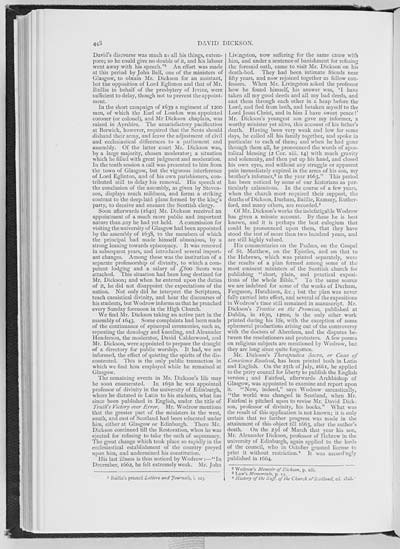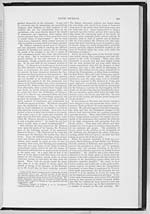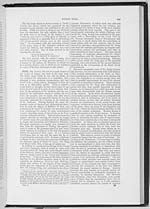445
David's discourse was much as all his things, extem-
pore; so he could give no double of it, and his labour
went away with his speech."l An effort was made
at this period by John Bell, one of the ministers of
Glasgow, to obtain Mr. Dickson for an assistant,
but the opposition of Lord Eglinton and that of Mr.
Baillie in behalf of the presbytery of Irvine, were
sufficient to delay, though not to prevent the appoint-
ment.
In the short campaign of 1639 a regiment of 1200
men, of which the Earl of Loudon was appointed
coroner (or colonel), and Mr Dickson chaplain, was
raised in Ayrshire. The unsatisfactory pacification
at Berwick, however, required that the Scots should
disband their army, and leave the adjustment of civil
and ecclesiastical differences to a parliament and
assembly. Of the latter court Mr. Dickson was,
by a large majority, chosen moderator; a situation
which he filled with great judgment and moderation.
In the tenth session a call was presented to him from
the town of Glasgow, but the vigorous interference
of Lord Eglinton, and of his own parishioners, con-
tributed still to delay his removal. His speech at
the conclusion of the assembly, as given by Steven-
son, displays much mildness, and forms a striking
contrast to the deep-laid plans formed by the king's
party, to deceive and ensnare the Scottish clergy.
Soon afterwards (1640) Mr. Dickson received an
appointment of a much more public and important
nature than any he had yet held. A commission for
visiting the university of Glasgow had been appointed
by the assembly of 1638, to the members of which
the principal had made himself obnoxious, by a
strong leaning towards episcopacy. It was renewed
in subsequent years, and introduced several import-
ant changes. Among these was the institution of a
separate professorship of divinity, to which a com-
petent lodging and a salary of �800 Scots was
attached. This situation had been long destined for
Mr. Dickson; and when he entered upon the duties
of it, he did not disappoint the expectations of the
nation. Not only did he interpret the Scriptures,
teach casuistical divinity, and hear the discourses of
his students, but Wodrow informs us that he preached
every Sunday forenoon in the High Church.
We find Mr. Dickson taking an active part in the
assembly of 1643. Some complaints had been made
of the continuance of episcopal ceremonies, such as,
repeating the doxology and kneeling, and Alexander
Henderson, the moderator, David Calderwood, and
Mr. Dickson, were appointed to prepare the draught
of a directory for public worship. It had, we are
informed, the effect of quieting the spirits of the dis-
contented. This is the only public transaction in
which we find him employed while he remained at
Glasgow.
The remaining events in Mr. Dickson's life may
be soon enumerated. In 1650 he was appointed
professor of divinity in the university of Edinburgh,
where he dictated in Latin to his students, what has
since been published in English, under the title of
Truth's Victory over Error. Mr. Wodrow mentions
that the greater part of the ministers in the west,
south, and east of Scotland had been educated under
him, either at Glasgow or Edinburgh. There Mr.
Dickson continued till the Restoration, when he was
ejected for refusing to take the oath of supremacy.
The great change which took place so rapidly in the
ecclesiastical establishment of the country preyed
upon him, and undermined his constitution.
His last illness is thus noticed by Wodrow :�"In
December, 1662, he felt extremely weak. Mr. John
1 Baillie's printed Letters and Journals, i. 125.
Livingston, now suffering for the same cause with
him, and under a sentence of banishment for refusing
the foresaid oath, came to visit Mr. Dickson on his
death-bed. They had been intimate friends near
fifty years, and now rejoiced together as fellow con-
fessors. When Mr. Livingston asked the professor
how he found himself, his answer was, 'I have
taken all my good deeds and all my bad deeds, and
cast them through each other in a heap before the
Lord, and fled from both, and betaken myself to the
Lord Jesus Christ, and in him I have sweet peace!'
Mr. Dickson's youngest son gave my informer, a
worthy minister yet alive, this account of his father's
death. Having been very weak and low for some
days, he called all his family together, and spoke in
particular to each of them; and when he had gone
through them all, he pronounced the words of apos-
tolical blessing (2 Cor. xiii. 14) with much gravity
and solemnity, and then put up his hand, and closed
his own eyes, and without any struggle or apparent
pain immediately expired in the arms of his son, my
brother's informer,2 in the year 1663." This period
has been noticed by some of our historians as par-
ticularly calamitous. In the course of a few years,
when the church most required their support, the
deaths of Dickson, Durham, Baillie, Ramsay, Ruther-
ford, and many others, are recorded.3
Of Mr. Dickson's works the indefatigable Wodrow
has given a minute account. By these he is best
known, and it is perhaps the best eulogium that
could be pronounced upon them, that they have
stood the test of more than, two hundred years, and
are still highly valued.
His commentaries on the Psalms, on the Gospel
of St. Matthew, on the Epistles, and on that to
the Hebrews, which was printed separately, were
the results of a plan formed among some of the
most eminent ministers of the Scottish church for
publishing "short, plain, and practical exposi-
tions of the whole Bible." To the same source
we are indebted for some of the works of Durham,
Ferguson, Hutchison, &c.; but the plan was never
fully carried into effect, and several of the expositions
in Wodrow's time still remained in manuscript. Mr.
Dickson's Treatise on the Promises, published at
Dublin, in 1630, 12mo, is the only other work
printed during his life, with the exception of some
ephemeral productions arising out of the controversy
with the doctors of Aberdeen, and the disputes be-
tween the resolutioners and protesters. A few poems
on religious subjects are mentioned by Wodrow, but
they are long since quite forgotten.
Mr. Dickson's Therapeutica Sacra, or Cases of
Conscience Resolved, has been printed both in Latin
and English. On the 25th of July, 1661, he applied
to the privy council for liberty to publish the English
version; and Fairfoul, afterwards Archbishop of
Glasgow, was appointed to examine and report upon
it. "Now, indeed," says Wodrow sarcastically,
"the world was changed in Scotland, when Mr.
Fairfoul is pitched upon to revise Mr. David Dick-
son, professor of divinity, his books." What was
the result of this application is not known; it is only
certain that no further progress was made in the
attainment of this object till 1663, after the author's
death. On the 23d of March that year his son,
Mr. Alexander Dickson, professor of Hebrew in the
university of Edinburgh, again applied to the lords
of the council, who in October granted license to
print it without restriction.4 It was accordingly
published in 1664.
2 Wodrow's Memoir of Dickson, p. xiii.
3 Law's Memorials, p. 13.
4 History of the Suff. of the Church of Scotland, ed. 1828.

![]() Universal Viewer |
Universal Viewer | ![]() Mirador |
Large image | Transcription
Mirador |
Large image | Transcription
![]()

